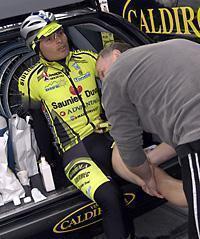A soigneur is a team helper, whose job ranges from general dogsbody and factotum to masseur and nutritionist. Soigner means “to care for” or “to treat (an illness)” in French and a soigneur is carer, although someone who works helping the sick or the elderly is usually called an “aide soignante“, the term soigneur is reserved for the cycling world.
One thing that’s different in France is that any soigneur who practices a massage has to be certified and registered with the French state as a physiotherapist. This law came into place in 2004, forbidding anyone from offering massage services unless they are a registered physio. The reason was deliberate: to weed out the witchdoctors within the sport and introduce a degree of professionalism for those working behind the scenes. In particular, a couple of soigneurs at the time seem to have been hired from Eastern Europe because they were able to import doping products with ease.
The law came as a shock to the cycling world. Guys who had been massaging the legs of champions for decades suddenly found they were banned from their jobs. They could still hand up musettes in the feed zone or rub embrocation into the legs but a post-race massage, perhaps the essential task of a soigneur, was outlawed. “When I work in France, without the massage, I feel useless. You depend on the massage” said Patrick Gagnier, a soigneur with FDJ.com, who was been rubbed the legs of Bernard Hinault, Marc Madiot and Charly Mottet.
The same law has led to a strange situation where team soigneurs can give massages abroad but find themselves barred from massage in France. French teams have had to recruit additional, registered, staff but it’s proving problematic as the peripatetic nature of the sport demands long hours and plenty of travel: but registered physios are contracted to work only 35 hours per week.
Many physios, or kinés, as they are known in France aren’t cycling enthusiasts and are just doing a job. This isn’t the end of the world but cycling places a lot of demands on those involved, it is not the sort of world compatible with regular hours and fixed working conditions. It’s put a considerable operating expense on the French teams.
For me the law smacks of politicians looking for a “something must be done” law. Some soigneurs were complicit in doping and the law was a means to weed them out but simply banning them from massage did not stop the more unscrupulous types, instead they stayed on as coach drivers or lurked in the background: the law didn’t fix the problems, it displaced them, whilst extending the monopoly power of registered kinés in France.
French teams are very clean these days. Not perfect but the larger teams have realised they have the luxury of guaranteed entry into the Tour de France without the pressure of results. So they can ride clean and avoid scandal, especially since the French public and media have a stronger anti-doping stance, conditioned by the fall out of the Festina affair, than others in say Spain or Italy. The economics of massively valuable coverage in July means they don’t have to be the best in the race to justify investment to a sponsor. This is mainly why French teams are healthier places.
First photo from cyclingnews.com


